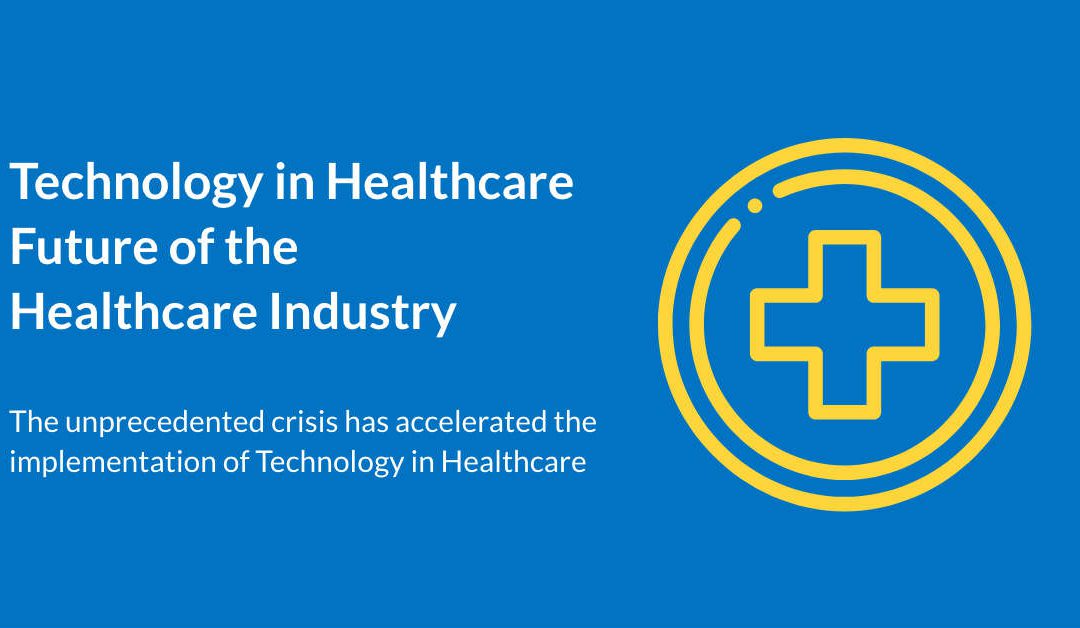The Healthcare industry is playing a critical role in curbing the transmission of COVID-19. This unprecedented crisis has accelerated the implementation of technology in healthcare industry. These solutions and their implementation had been struggling to prove their value. If we look closely, only the countries that have relied on adopting digital technologies and their implementation into policy and health care are the countries that have been successful in containing this disease. These technologies are enabling the healthcare ecosystem to perform more efficiently by providing optimal solutions across a broad range of applications in the healthcare industry. Here are a few technologies that are all set to shape the future of the healthcare industry.
Artificial Intelligence (AI):
The cost and difficulty of receiving proper healthcare by the general public in the United States have always been a subject of debate. On top of that COVID-19 has created a severe strain on healthcare resources across the world. This issue can be tackled with the help of AI tools and techniques that employ intelligent algorithms to optimize the performance of hospitals and health organizations. Powerful AI tools analyze the large database of patients and citizens and provide a solution to enhance the experience of healthcare services for both the general public and healthcare providers. The application of AI enables healthcare organizations across the world to boost efficiency and streamline daily functions. AI has also been an important asset that has facilitated rapid diagnosis and risk prediction of COVID-19. It enables the researchers to run hundreds of parallel trails of vaccine development in a short time that moves them one step closer to finding a vaccine or cure for several deadly diseases.
Machine learning (ML):
Advanced Machine learning algorithms are a powerful tool for the identification and diagnosis of diseases that are otherwise hard to diagnose. This also helps in the early-stage drug discovery process. Today, machine learning is being put to use in monitoring and predicting epidemics around the world. With access to a large amount of data collected from satellites, real-time social media updates, etc, artificial neural networks help to collate this information and predict everything from malaria outbreaks to COVID-19 outbreaks. Currently, machine learning technology is also incorporated in fitness trackers and other devices that we use daily. For example, the new Apple Watch Series 6 uses advanced ML and AI algorithms, and powerful hardware to classify your movements, track your heart rate, and even analyze your blood oxygen levels. This will prove to be an important health feature because oxygen saturation has become a key metric to monitor during the COVID-19 pandemic as low blood oxygen levels are one of the symptoms of COVID-19. Thus, ML and AI are destined to add further value to the healthcare industry in the coming days.
Cloud computing:
Mandatory practices such as Electronic Medical Records (EMR) have already primed healthcare systems for cloud computing and data analytics. Hospitals are gathering an overwhelming amount of data of the patients amid the coronavirus pandemic. Also, the amount of data that needs to be shared or generated, and the speed at which it all happens, puts a lot of pressure on healthcare professionals. This is where cloud computing comes in. With the use of cloud computing, the healthcare industry will find storing and managing this huge amount of data to be more efficient and cost-effective. Innovators like Intone Networks enable hospitals to upload, share, and recover data at a quick pace to achieve higher overall performance with their cloud computing services.
Telemedicine:
During this pandemic, doctors and patients alike are at risk of contracting the coronavirus in hospitals. During this critical time, Telemedicine has been an effective tool in containing the spread of COVID-19. The growth of the 5G network has enabled the use of virtual care platforms, video conferencing, and digital monitoring to reduce exposure to the virus. On top of that, involving cloud computing in telemedicine systems ensures that we have reliable and safe telemedicine practices.
Traditional businesses and IT sectors are not the only fields being impacted by digitization and technologies in these hard times. Healthcare is a field that is highly suitable for the applications of these advanced technologies. Thus, the application of technology in healthcare such as AI, ML, and cloud computing in the healthcare industry is beyond the scope of COVID-19. These technologies are all set to make healthcare safer, efficient, and accessible to everyone.

